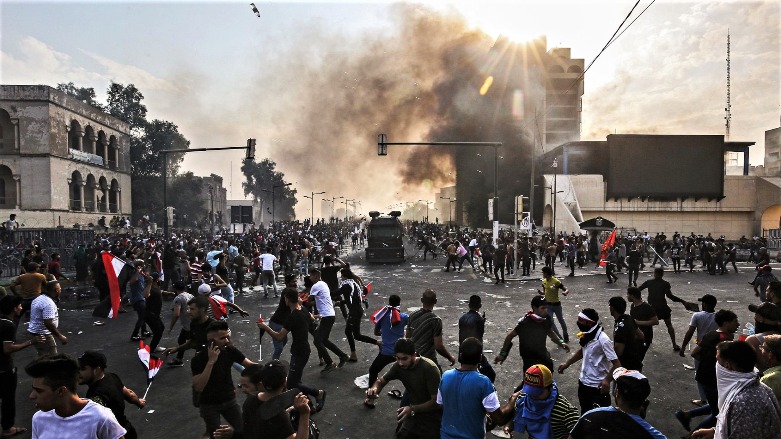‘Where’s my killer?’: Iraqis call for accountability in protesters’ deaths

ERBIL (Kurdistan 24) – A new slogan has surfaced in the most recent wave of demonstrations in Iraq’s ongoing protest movement across several Iraqi provinces, including the capital on Tuesday, calling for the end of impunity for the killings of civil society activists and protestors.
Crowds held up signs showing the faces of dozens of fallen comrades, with the words, “Where’s my killer?,” sometimes translated as “Who killed me?”
Groups of protestors, many of them from southern Iraqi provinces, came together in central Baghdad’s Nisour Square on Tuesday to call attention to the government’s inability or unwillingness to rein in militias and affiliated political parties behind the abduction or targeted assassination of some 70 protesters in the past year and a half.
Since the demonstrations against poor public services, a low standard of living, and institutional corruption began in October 2019, hundreds of others have died as well at the hands of riot police and Iran-backed militias of the Popular Mobilization Forces (PMF).
Many gathered in the capital called to remove the administration of Prime Minister Mustafa al-Kadhimi from power for not fulfilling its promises to find and punish those responsible for the deaths. Kadhimi began his term in May 2020 after his predecessor stepped down as a direct result of the widespread violence against the largely peaceful protests.
Of the activists whose likenesses could be seen on signs and placards, the most recently deceased was prominent civil society figure Ihab al-Wazni, gunned down in an ambush by two gunmen in early May in front of his home in the southern province of Karbala.
Read More: Assassination of Iraqi activist sparks fresh protests in Karbala
Al-Wazani is one in a long series of targeted killings that multiple foreign governments and human rights organizations, as well as the United Nations, have blamed on the PMF.
Media workers and journalists are routinely threatened at the protests or barred from covering them. The Kurdistan 24 correspondent in Baghdad, for example, used his personal cell phone to clandestinely cover the gathering to avoid being targeted himself.
The newly sparked protests are mainly centered on the call to end the impunity enjoyed by PMF militias, well outside the police or military chains of command, as well as the resignation of Kadhimi and his interim government, intended to be in place only until the winner of Iraq’s upcoming election planned for October takes the mantle.
Security forces have deployed numerous units at traditional protest venues, including the most famous of them, Tahrir Square, across the Tigris River from the fortified Green Zone where many government buildings and foreign missions are located.
Friends and family members of the murdered activists showed up with thousands of others to demand the killers be brought to justice. A growing number of them are also calling for a boycott of the election.
"We are firmly against holding elections as long as weapons are freely available and killings continue," read a statement released by members of a group dubbed the National Bloc that recently joined an alliance of 17 other like-minded organizations who decry Iraq’s lack of effective governance, blamed largely on rampant and blatant institutional corruption.
The Iraqi president announced on Sunday that $150 billion from the public treasury has been stolen from the national treasury since the 2003 overthrow of the previous government of Saddam Hussein.
Editing by John J. Catherine
